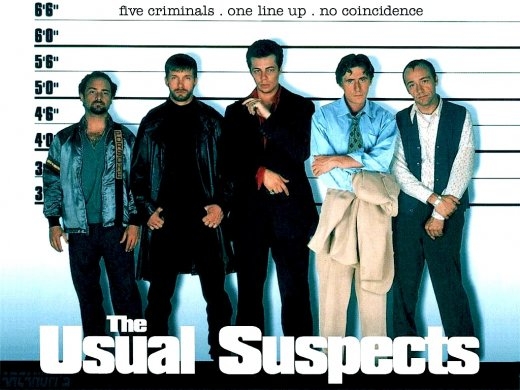
BY MATTHEW DADDONA In 12 years, Bryan Singer hasn’t made a film nearly as electrifying or groundbreaking as The Usual Suspects, a testament not only to himself but also to the nature of fast, gripping crime stories. Singer, who recently directed the X-Men films and Superman Returns, is the mastermind behind this 1995 drama’s wit and suspense, and quite simply, the delicious irony of its title. The film opens with literal bang: A mysterious explosion on a ship, in which 27 men die over a reported $91 million in cocaine. From there we meet all the ‘usual suspects’ in a police lock-up. Kevin Spacey, in a star-making turn as Roger “Verbal” Kint, narrates the backstory of the capture and inquisition of all five suspects, including himself, after a truckload of gun parts is hijacked in Queens six months before the blast. Thus, Singer develops two parallel stories: The quest to find the enigmatic explosion’s creator, and the titular suspects’ plan to carry out a heist and seek vengeance on the cops who locked them up.
*
Spacey’s Verbal is the odd man out in this hardened, greased-up group, which includes surly Todd Hockney (Kevin Pollak), boastful Michael McManus (Stephen Baldwin), his incomprehensible partner Fred Fenster (Benicio Del Toro), and sly Dean Keaton (Gabriel Byrne). Verbal is small, has a faulty leg and a limp, speaks way too often, and is a compulsive liar. But do these suspects matter anyway? For the film’s purpose, they are merely a subplot working to heighten tension, lure us in, misdirect and distract us from the more significant question: Who is Keyser Soze, the infamous, but always off-screen Hungarian super-gangster? The hunt for Soze’s identity sets up some of the most powerful moments in the film, especially Spacey’s interrogation by U.S. Customs Agent David Kujan (Chazz Palminteri), in which Verbal does everything but tell the truth about what exactly happened that night on the ship.
Here, Singer is pushing the limit of his audience, giving us Verbal’s subjective version of the incident which, in turn, we process as the only single, correct account. The complexity of The Usual Suspects’ script lies in separating what is known from what the audience needs to know. Singer is generous in doling out clues, but the information the audience needs is all out of place, all ultimately misleading. After all, Verbal is the clue-giver, the unreliable narrator. The Usual Suspects arrived amidst a crime-flick culture dominated by Quentin Tarantino’s Reservoir Dogs and Pulp Fiction, and was by Danny Boyle’s explosive Trainspotting. But the potency of the film’s mood, convoluted plotting, and the originality of the characters has not faded with time. They are all ultimately part of an ageless riddle. Twelve years later, the case has still not been completely cracked.
ABOUT THE AUTHOR: Matthew Daddona is a freshman at Temple University. He was six years old when The Usual Suspects was in theaters.
